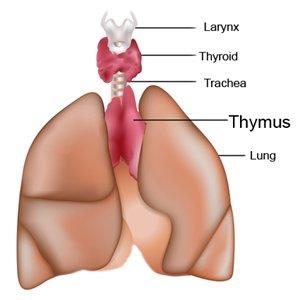 The thymus gland is situated in the upper thorax" title="The thymus gland is situated in the upper thorax
Imagine one gland in the body which is as big as a manís fist when we are born controlling, how we react and whether we are immune or not. And this one gland shrinks to the size of our thumbnail, as we get older. This crucial gland is the Thymus gland. Thymus is especially involved in T cell maturation.
The thymus gland is situated in the upper thorax" title="The thymus gland is situated in the upper thorax
Imagine one gland in the body which is as big as a manís fist when we are born controlling, how we react and whether we are immune or not. And this one gland shrinks to the size of our thumbnail, as we get older. This crucial gland is the Thymus gland. Thymus is especially involved in T cell maturation. The thymus lives in our chest, between our breast bone and our heart. It is responsible for producing T–cellsand is especially important in newborn babies – without a thymus – a baby's immune systemcollapses and the baby will die. The thymus seems to be much less important in adults – for example, you can remove it and an adult will live because other parts of the immune system can handle the load. However, the thymus is important, especially to T cell maturation.
The thymus is a specialized organ of the immune system. The thymus "educates" T–lymphocytes (T cells), which are critical cells of the adaptive immune system. Each T cell attacks a foreign substance which it identifies with its receptor. T cells have receptors which are generated by randomly shuffling gene segments. Each T cell attacks a different antigen. T cells that attack the body's own proteins are eliminated in the thymus. Thymic epithelial cells express major proteins from elsewhere in the body, and T cells that respond to those proteins are eliminated through programmed cell death (apoptosis).
Therefore, one of the most important roles of the thymus is the induction of central tolerance. The thymus is largest and most active during the neonatal and pre–adolescent periods. By the early teens, the thymus begins to atrophy and thymic stroma is replaced by adipose (fat) tissue. Nevertheless, residual T lymphopoiesis continues throughout adult life.